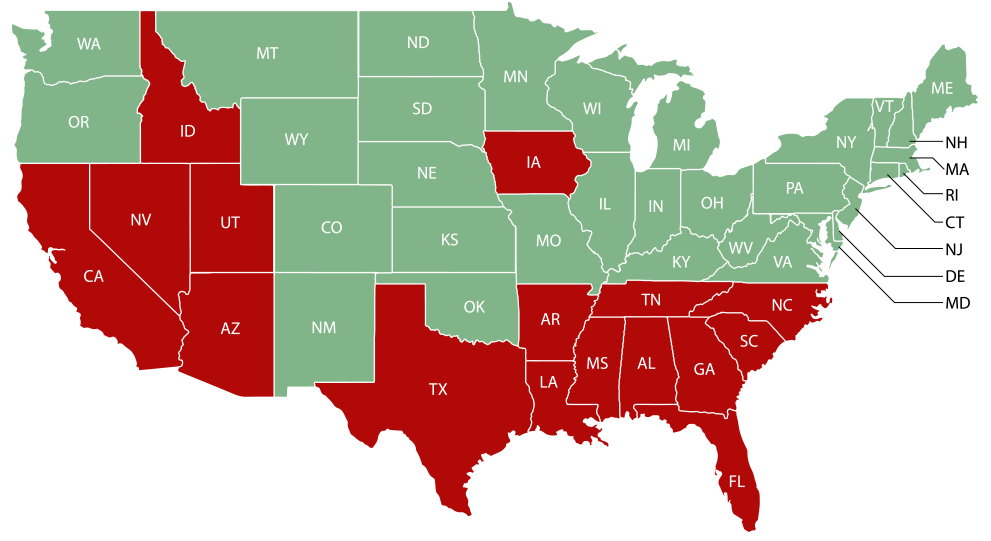

The State of Connecticut issued a travel advisory on on Wednesday, June 24, 2020 for anyone traveling into Connecticut, from a state that has a new daily positive test rate higher than 10 per 100,000 residents or a state with a 10% or higher positivity rate over a 7-day rolling average are directed to self-quarantine for a 14-day period from the time of last contact within the identified state.
As of Tuesday, June 30, there are sixteen states that meet the criteria:
- Alabama
- Arkansas
- Arizona
- California
- Florida
- Georgia
- Iowa
- Idaho
- Louisiana
- Mississippi
- North Carolina
- Nevada
- South Carolina
- Tennessee
- Texas
- Utah
Frequently Asked Questions on Connecticut's Travel Advisory
- How is this going to be enforced? In order to protect health and safety and limit the spread of COVID-19, travelers from impacted states are strongly urged to carefully follow the Travel Advisory. It will be up to individuals to abide by the advisory.
- How are the impacted states chosen? The advisory applies to any person arriving from a state with a daily positive test rate higher than 10 per 100,000 residents over a 7-day rolling average or a state with a 10 percent or higher test positivity rate for COVID-19 tests over a 7-day rolling average. The list of states is fluid and will be updated weekly onto this website.
- Who does the advisory apply to? This travel advisory applies to all travelers whose travel originates from the impacted states, and also applies to Connecticut residents who are returning from a visit to the impacted states.
- What does quarantine mean? Quarantine is used to keep someone who might have been exposed to COVID-19 away from others. Quarantine helps prevent spread of disease that can occur before a person knows they are sick or if they are infected with the virus without feeling symptoms. Those in quarantine should stay home, separate themselves from others, and monitor their health.
- Are there any exemptions for essential travel? Yes. Workers traveling from impacted states to Connecticut who work in critical infrastructure as designated by the Cybersecurity and Infrastructure Security Agency, including students in exempt health care professions, are exempted from the quarantine advisory when such travel is work-related. This includes any state, local, and federal officials and employees traveling in their official capacities on government business.
- How long is the quarantine? The advisory requires visitors to Connecticut from the impacted states to quarantine and self-monitor for 14-days. Those travelers coming to Connecticut for shorter stays can quarantine and self-monitor for less than that if their stay is shorter.
- If I am coming to Connecticut to a hotel or bed and breakfast, can I do the quarantine there? Yes. Connecticut, New York, and New Jersey are all asking hotels to communicate the 14-day quarantine to guests who have traveled from one of the impacted states.
- Does the quarantine recommendation also extend to passengers flying to Connecticut on connecting flights that stop in high infection states before arriving in Connecticut? No. Quarantine does not apply to travelers who just have a layover in an impacted state.
- If I live in Connecticut and have a household member or guest returning from an impacted state, do I and other household members who have not traveled to an impacted state also need to self-quarantine? Out-of-state visitors from impacted states are encouraged to postpone travel. If not possible to delay travel, individuals are encouraged to self-quarantine in the home they are returning to in Connecticut. If not possible to self-quarantine from other household members, those other household members who did not travel from an impacted state are not required to self-quarantine.
- Can travelers be tested for COVID-19 instead of self-quarantine? Quarantine is the best option to prevent spread of disease. However, if a 14-day self-quarantine is not possible, travelers from the impacted states may enter Connecticut if they have had a negative viral test (not an antibody test) for COVID-19 in the 72 hours prior to travel.
- Should non-essential travel to impacted states be avoided? Yes. Because of the risk of contracting infection, and because of the need to self-quarantine on return, Connecticut residents are urged to avoid travel to the impacted states whenever possible.
N